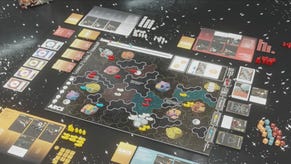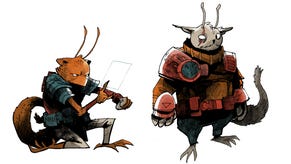Root and Oath creator announces story-driven sci-fi board game Arcs: Collapse and Conflict in the Void
Designer Cole Wehrle, artist Kyle Ferrin and publisher Leder Games plan Kickstarter for 2022.
Root and Oath: Chronicles of Empire and Exile designer Cole Wehrle has revealed that his next release will be a narrative board game set in space.
Arcs: Collapse and Conflict in the Void - the upcoming board game’s non-final working title - sees Wehrle once again reunite with Root and Oath illustrator Kyle Ferrin as part of publisher Leder Games.
According to Wehrle, Arcs grew out of his work on Oath, the ambitious strategy game released earlier this year that sees players wrestle for control of an evolving fantasy land. Key to the game is its Chronicle system, with players’ actions and the outcome of each session resulting in a different setup and world for subsequent playthroughs - similar to a legacy game, but with no permanent modification or fixed endpoint. In our review of Oath, I called it a masterpiece of storytelling, writing: “Oath is the kind of game that makes you want to talk about it - with the people you play with, with people who wonder what board games have to offer at their best, with anyone who just loves hearing fun stories of diplomacy, intrigue and betrayal in colourful fantasy worlds.”
“I was filled with all sorts of odd ideas that didn't fit into that game,” Wehrle said in a Twitter thread announcing Arcs. “I wanted to stay in the space but design something new.”
Wehrle combined his gameplay ideas with the sci-fi setting of a space board game then in development at Leder, creating Arcs’ basic framework during a self-imposed two-week game jam.
The designer described Arcs’ “intriguing action structure” as akin to a simplified version of Root, his 2018 breakthrough in which players control the warring animal factions of a woodland. Each faction controls with a unique set of gameplay mechanics, from the Marquise de Cat’s resource collection and building to the avian Eyrie’s card-driven decree, resulting in a relatively steep learning curve for beginners.
“I used to describe Oath as learning 2 or 3 Root factions at once,” Wehrle said. “Arcs is probably less than a single Root faction. It has a simple action structure with a lot of room for clever play.
“The other exciting thing about the design is how fundamentally simple it is. This is probably my simplest game.”
Like Oath, the focus of Arcs is on allowing the players to create a narrative as they play, with Wehrle saying both games were heavily influenced by roguelike video games. Unlike the open-ended evolution of Oath’s Chronicle, however, Arcs is deliberately built around short campaigns that last between two and four roughly hour-long sessions - referred to as ‘episodes’.
“If Oath atomized the kinds of mechanical/narrative changes that occur over a campaign game or RPG, Arcs is just a little more narratively chunky,” Wehrle said. “By that I mean that there are more narrative set pieces and explicitly branching narratives.
“While Oath offered a persistent sandbox, Arcs allows players to assemble stories which have clear beginnings, middles, and endings.”
The tighter narrative focus of Arcs means that the same group of players - the game specifically supports either three or four people - must be present for the whole of a campaign. A complete campaign is estimated to last between three and five hours, with the option to ‘save’ the group’s progress in-between individual episodes.
The self-contained nature of Arcs’ campaigns means that players can expect more dramatic outcomes by the end of each arc, Wehrle said, adding that “there's a ton of replayability” as the result of the game’s storytelling potential.
“Because the game ends, this allows me to push the design into much wilder places,” the designer explained. “With Oath, I knew that the worlds created by players had to be habitable at the end of the game. The story had to continue for the game to work.
“Arcs has no such burden. This means [the] player can wreck the sandbox and develop into positions of asymmetry as radical as those seen in Root and Vast. Essentially, while Oath drew heavily from traditions of historiography, Arcs gets to draw on narrative/storytelling traditions.”
Alongside his musings on Arcs’ gameplay design, Wehrle posted a first look at Ferrin’s artwork for the game, revealing a mixture of spaceship designs, robots and alien creatures. (Wehrle notes that the game’s visuals, name and gameplay could all change before it ultimately hits tables.)
A Kickstarter campaign for Arcs is expected to launch in the first half of 2022, with more details due to be revealed later this year.








